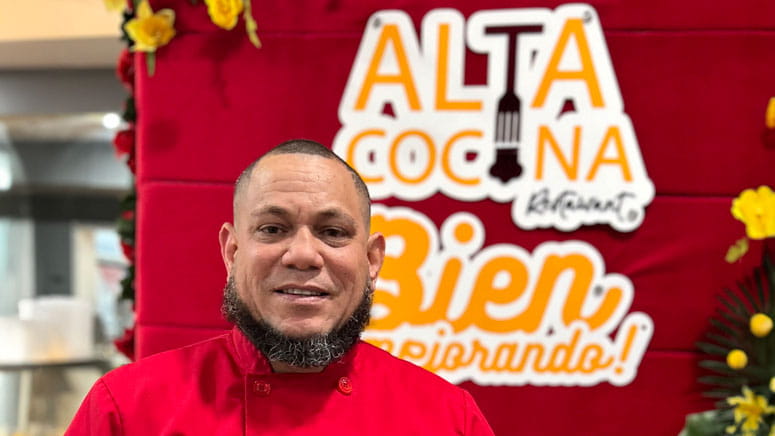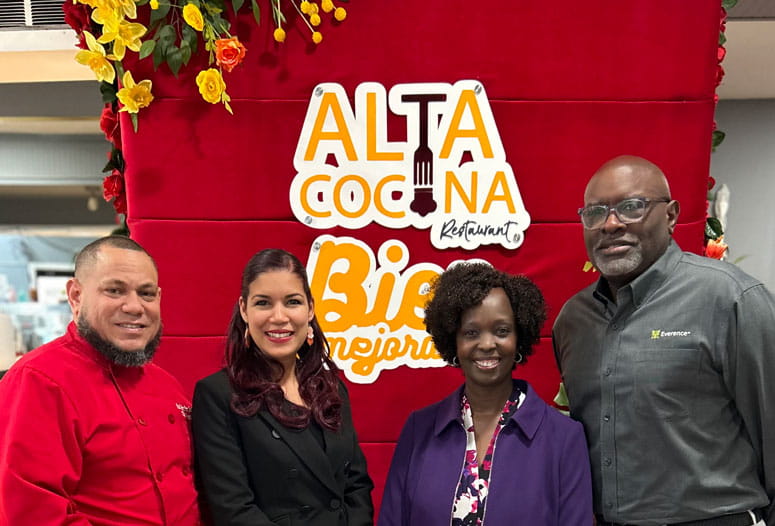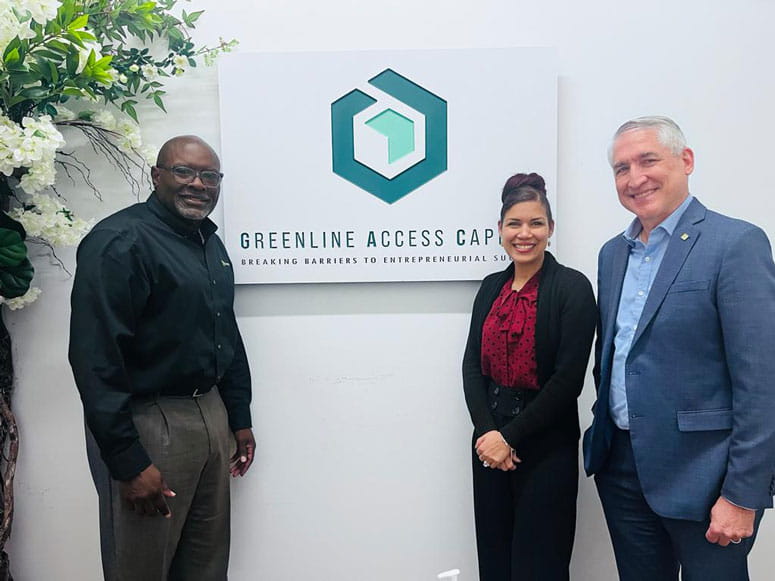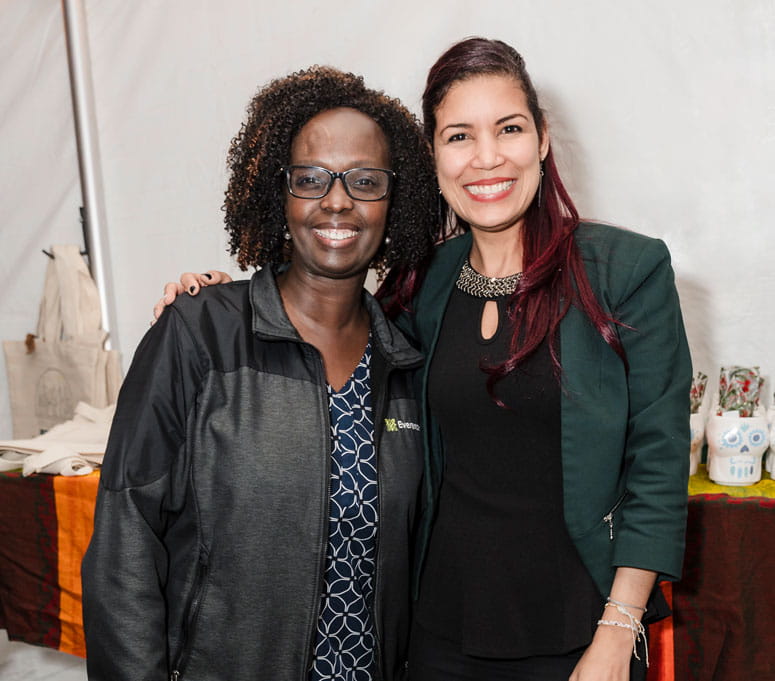The recipe for a strong community
Everence and Greenline Access Capital partner to provide opportunities in Philadelphia
José Luis Reynoso opened Alta Cocina in 2022 with a small business loan from Everence and Greenline Access Capital. (Photo by Kevin Gil, Everence)
Leer en español José Luis Reynoso, Kersy Azocar, Stella Tai and Leonard Dow. (Photo by Kevin Gil, Everence) Leonard Dow, kersey Azocar and Everence President and CEO Ken Hochstetler. (Photo provided GAC) Stella Tai (left) and Kersy Azocar (right) pose for a photo at an event celebrating the launch of the partnership between Everence and Greenline Access Capital in December 2023. (Photo Palaeli Studio)
Since he began cooking at 15-years-old, José Luis Reynoso dreamt of opening a restaurant of his own.
“For me, all my life, that has been an aspiration, a passion,” he said.
Today, he is the owner and head chef of Alta Cocina – a food truck and restaurant located in northeast Philadelphia.
It took years of planning and budgeting but in 2018, José opened his food truck. His restaurant later opened in late 2022.
The restaurant and food truck specialize in Dominican-European fusion food, a nod to José Luis’ upbringing in the Dominican Republic and his experience working as a chef across Europe. Both locations sell traditional chicken mofongo drenched in white sauce, salmon parmesano served with tostones, and a selection of other fusion dishes, highlighting the best of the two cuisines.
Though Alta Cocina has found great success in the community, José Luis wanted to improve his business. He wanted to make a few changes to enhance the customer experience and atmosphere of the restaurant.

While his restaurant had been funded entirely out-of-pocket, Greenline Access Capital, an emerging Community Development Financial Institution (CDFI), encouraged and helped José Luis apply for a small business loan with Everence®.
And in January 2024, Alta Cocina became the first to receive a small business loan from the new community development investing partnership between Greenline Access Capital and Everence.
The partnership, established in late 2023, works to provide small businesses with loans to qualified entrepreneurs in immigrant and historically disadvantaged communities.
Through the initiative, Everence Community Investments provides the capital, while Everence Federal Credit Union underwrites and administers the loan. Greenline Access Capital helps the business apply for the loan and guides them through the qualification process.
José Luis has seen positive impacts since he received the loan from Everence and Greenline and invested it into making improvements on his restaurant. Regular customers have noticed the changes he’s made and have been impressed, José Luis said.
Alta Cocina has seen an uptick in business as well. More customers are coming to eat, more takeout orders are being called in.
“The loan has helped a lot,” he said. “I’ve seen the results.”
INVESTING IN KENSINGTON, TOGETHER
Alta Cocina’s restaurant is located in the greater Kensington area. Kensington, one of Philadelphia’s poorest neighborhoods, has long struggled with inequity and disinvestment – issues Everence and Greenline are trying to address through their partnership.
Located a half-mile apart from each other in Kensington, Everence Federal Credit Union and Greenline Access Capital make up part of a larger system of organizations striving to provide residents with educational financial services and opportunities, as well as affordable health care and healthy food options.
In March 2020, after years of strategic planning, Everence Federal Credit Union was poised to open in Philadelphia. Everence had spent years building a strong relationship with Esperanza Health Center, and the credit union’s retail location would be housed in the health center’s newly renovated medical building, located at Kensington and Allegheny avenues.
But due to the COVID-19 pandemic, the credit union was unable to open until August 2021.
The pandemic hit Kensington hard. The neighborhood already experienced the worst of the opioid epidemic before the pandemic, and COVID-19 only exacerbated the problem. The shelter-in-place order restricted residents’ access to healthcare and harm reduction services , causing an uptick in overdose fatalities across the city, according to the Office of the Mayor in Philadelphia.
“It’s been clear that the pandemic took a heavy toll on the Kensington area, a community that was already dealing with many challenges,” said Stella Tai, Stewardship Investing Impact and Analysis Manager at Praxis Mutual Funds. “It’s going to take lots of patience, creative ideas and investment for Kensington to recover.”
After seeing the impact that the pandemic had on the community, numerous businesses left Kensington.
Leonard Dow, President of Everence Community Investments and Vice President of Community & Church Development, said many expected Everence to do the same.
“The assumption was that Everence wouldn’t be here on the other side,” Leonard said.
While the Philadelphia office is still open today, it hasn’t been an easy journey so far, Leonard said.
“The pandemic impacted our trajectory as it relates to growth and engagement in the community and business,” Leonard said. “But it also gave us a need to revisit how we want to engage the marketplace here in Philadelphia.”
The credit union initially planned to focus on providing Kensington consumers with impact loans, but due to COVID-19’s damage on the vulnerable community, it was clear that Everence needed to pivot. Instead of just consumers, Everence chose to also focus on serving small businesses.
That’s when Stella got in touch with Kersy Azocar, President and CEO of Greenline Access Capital, an emerging CDFI located in Kensington.
With the help of community leaders, Kersy launched Greenline Access Capital with the goal of providing microbusinesses with equitable access to the financial resources and capital needed to achieve financial wealth and resiliency.

The collaboration between Everence and Greenline Access Capital was a no-brainer, said Kersy. Both organizations are aligned in their missions of serving the underbanked, helping disadvantaged populations achieve financial wealth and creating change in historically oppressed communities.
“It takes a tribe to help small businesses,” Kersy said.
In Philadelphia, it’s especially difficult for minority business owners. Annual studies conducted by the Federal Reserve have found that profound structural barriers limit minority entrepreneurs from accessing capital.
Teaming up to accomplish this shared vision made sense.
Through this partnership, Greenline Access Capital can connect small business owners with Everence and ensure they get the funding and technical assistance they need to achieve their goals, Kersy added.
“Kersy has a long history of working in historically underserved communities. Everence doesn’t have that history in Philadelphia,” Leonard said. “Greenline Access Capital provides Everence access in ways that would take us a long time to achieve.”
Partnerships have been key for Everence in their work in Philadelphia. Leonard noted that while the organization is well-known and trusted in Anabaptist areas, in Philadelphia, Everence is new and mostly unknown to the city and its residents. The work and success of Everence in Kensington is reliant on building strong partnerships with like-minded organizations, such as Esperanza Health Center or Greenline Access Capital.
“If you want to engage with a historically underserved community or a redlined community, you can’t do it alone,” he said.
“ON THE RIGHT SIDE OF HISTORY”
A key contributor to Kensington’s struggle with poverty and disinvestment is its past as a “redlined” neighborhood.
Redlining was an unjust practice that came from a 1930s-era New Deal program in which individuals were denied financial services due to their race, ethnicity and residency in certain minority neighborhoods, which were often deemed “dangerous” or “hazardous.”
Greenline Access Capital’s name comes from one of the nonprofit’s board members who envisioned a “greenlined” Philadelphia – a stark contrast to the city’s historic redlining practices.
Today, Kensington is still reeling from the negative impacts of the discriminatory practice.
A study conducted by the National Community Reinvestment Coalition found that redlined neighborhoods in Philadelphia received 20% fewer business loans than non-redlined neighborhoods from 2012 to 2016. Of the loans received, a significant portion were much smaller than those given to businesses located in non-redlined neighborhoods.
“With this partnership, we feel like we’re on the right side of history in connecting with Greenline Access Capital and helping them achieve that movement of ‘greenlining’ communities,” Stella said.
That is a key reason why the credit union chose to open a location in the northeast Philadelphia neighborhood – to serve individuals and communities who have been unjustly barred from receiving financial services in the past.
“By choosing Kensington, it shows that Everence cares about making an impact,” Stella said. “We care about being used by God to have a positive financial impact on those who are on the margins.”
JUST A TASTE

Stella and Kersy both see the partnership between Everence and Greenline Access as a model for change across the country to serve communities struck down by historical oppression.
If the partnership continues to be successful, Everence may look at potentially replicating the partnership in areas such as Elkhart, Ind., or Harrisonburg, Va., Stella said.
In the meantime, José Luis’ restaurant and food truck, Alta Cocina, are just a taste at what is to come from the relationship between Everence and Greenline Access Capital. More loans are in the works.
“We want to continue this success story,” Kersy said.
